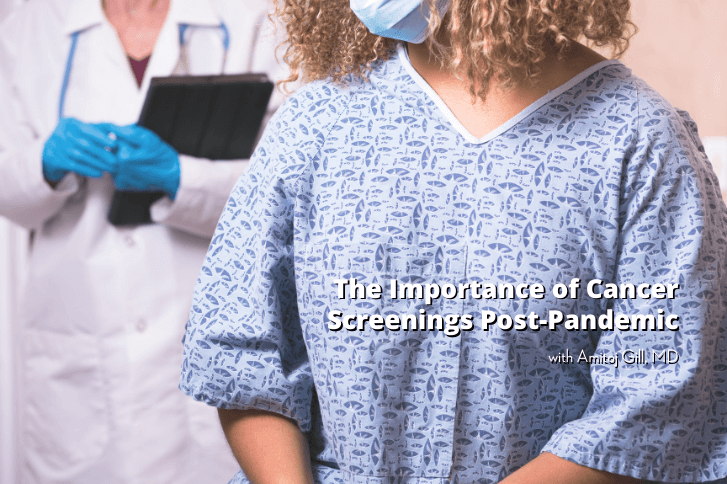Lung Cancer: The Road to Recovery

Apple Podcasts Google Play iHeartRadio Tunein Spotify Amazon
Kentucky leads the nation in lung cancer illness and deaths, and Indiana is not far behind. However, when discovered early, the disease is treatable, and patients have a much better prognosis.
In this episode, oncology nurse practitioner Tracy Hagan, APRN, stops by between seeing patients to shed light on lung cancer. She describes in detail the types of lung cancer, its stages, and typical treatment plans.
In addition, Hagan discusses the disease’s causes and risk factors such as smoking, the No. 1 cause of lung cancer deaths.
Listen now to learn who is eligible for preventive lung CT screenings and what to expect after a diagnosis.
Key Takeaways:
[1:19] Kerri Bonner introduces Tracy Hagan, an advanced practice nurse at the Merle M. Mahr Cancer Center.[1:49] Tracy talks about the delayed timing of most lung cancer diagnoses and the likelihood of smokers being diagnosed as well.
[3:51] Tracy talks about the two different types of lung cancer: non-small cell lung cancer and small cell lung cancer.
[5:05] Tracy talks about the screening available at the Mahr Cancer Center.
[5:41] Mahr Cancer Center offers chemotherapy, radiation therapy, and surgery to patients diagnosed with lung cancer.
[7:14] Tracy discusses the average prognosis of a patient with lung cancer.
[7:46] When a patient has completed their therapy at the cancer center, Tracy presents them with a survivorship care plan.
[8:27] Tracy discusses how a patient can function after having a portion of the lung removed.
[9:04] Tracy shares the positive effects of quitting smoking and the decrease in many diseases and cancers.
Links:
Learn more about Baptist Health
Learn more about the Merle M. Mahr Cancer Center at Baptist Health in Madisonville
Hi. I’m Kerri with another episode of the HealthTalks NOW podcast. Big thanks for clicking and listening along. We’ve got a great one for you today wherever you’re tuning in. Tracy Hagan, APRN, is shedding light on lung cancer. She’ll provide an overview of the typical treatment plans and the stages to be aware of. You want to stick around and find out if it’s likely to return. Thank you for sitting down with me, Tracy. I know you’re seeing me between patients today and I appreciate your time. Would you introduce yourself and tell our listeners a bit about you and your role here at Baptist Health Madisonville?
Tracy Hagan: I’m Tracy Hagan. I’m the advanced practice nurse at the Merle M. Mahr Cancer Center. I primarily see patients in the outpatient clinic. I usually just follow up with patients. I also am also the survivorship care plan navigator, as well as I do all new chemotherapy education sessions for any new patients that will be starting treatment.
Kerri: Okay. Well, I read something startling as I was preparing to meet you pertaining to the timing of diagnosis and the need to be proactive with health and aware of symptoms. A small percentage, I believe it was 16% of people with lung cancer, will be diagnosed when it’s at its earliest stage when the disease is most treatable. This is a very important conversation today given Kentucky’s rates of smoking, and that they are higher than the national ones. As many of our listeners know, smoking is the leading cause of this cancer that we’re discussing today. In 2017 a quarter of adults smoked in the Commonwealth. It’s 24.6% . Nationally, the rate was 17.1%. Before we lose a potential listener who thinks this isn’t relevant to them because they don’t smoke, how common is it to get lung cancer and not be a former smoker, or if some are wondering, what if I live with a smoker, can I get lung cancer?
Tracy Hagan: Yes. You’re absolutely correct. Kentucky does have some of the highest smoking rates nationally. Also, exposure to other environmental agents. It is definitely important to diagnose and find lung cancers earlier rather than later. We do offer lung cancer screening at the Mahr Cancer Center. Usually, if you do an annual CT screening, you can find about 85% of lung cancers in the earliest, most curable, stage.
Kerri: Okay. If I do smoke, what are my chances of developing lung cancer?
Tracy Hagan: People who smoke cigarettes are 15 to 30 times more likely to get lung cancer, or die from lung cancer, than people who do not smoke. Cigarette smoking is linked to around 80% to 90% of lung cancer deaths.
Kerri: Wow. Other than smoking, how else can I get lung cancer?
Tracy Hagan: Exposure to other environmental agents, radon, secondhand smoking, air pollution, asbestos, diesel exhaust. There’s also even research going on to see if there’s genetic links for lung cancer.
Kerri: No kidding. What are the different types of lung cancer?
Tracy Hagan: There are two main types, what we classify as non-small cell lung cancer and small cell lung cancer. In the classification of non-small cell lung cancer, there are three subtypes, adenocarcinoma, which is typically the slowest growing lung cancer. It’s more common in women, and it occurs more often in younger people than other types of lung cancer. The second subtype is squamous cell carcinoma. This is actually found in the fat cells that line the inside of the airways. It’s often found in the central part of the lungs. It’s typically linked to heavy smoking history. The third subset is large cell carcinoma. This type can affect any part of the lung and tends to grow and spread quickly.
Tracy Hagan: The second type of lung cancer that we do see here is called small cell carcinoma. This one accounts for about 10 to 15% of lung cancers diagnosed. Typically it can be very fast-growing and spreads more quickly than non-small cell lung cancers. Small cell carcinomas, as also referred to oat-cell cancer, and is typically often found in smokers.
Kerri: Okay. You mentioned a screening. Who and when should they receive it and how often should one be screened?
Tracy Hagan: Based on the NCCN cancer guidelines that we utilize at the Mahr Center, they stratify risk factors in patient populations. The high risk would be anyone between the age of 55 and 75 who has a greater than a 30-pack year smoking history, or who has quit smoking within the past 15 years.
Kerri: Okay.
Tracy Hagan: Typically, those lung screenings are done annually.
Kerri: Okay. After a screening, can you tell me what the process is if someone receives an abnormal screening or an abnormal finding?
Tracy Hagan: The way our screening process typically works here, depending on how big a nodule would be seen on a lung cancer screening CAT scan would determine the next process. We would definitely want to have a tissue biopsy if at all possible, to help us make a diagnosis of lung cancer. Sometimes sputum cytology is used as well, but that’s not as accurate as an actual tissue biopsy.
Kerri: Okay. After this procedure, and the diagnosis is made, what are some of the treatment options available?
Tracy Hagan: At the Mahr Cancer Center, we do chemotherapy and we offer radiation therapy. Depending on what stage your cancer would be would determine who you would see. You may see just the medical oncologist in that setting. We do chemotherapy. We do targeted therapy such as immunotherapy. That seems to be the new way that we are going in treating lung cancers. We also have a radiation therapy department. The patient would see the radiation oncologist to determine if radiation would be an option. Certainly surgery. If lung cancer is caught early enough, some patients may often only need surgery.
Kerri: Okay. How long is a typical round of chemo?
Tracy Hagan: That typically depends on the type of lung cancer that a patient has and the stage. Certainly the earlier the stage would mean less therapy needed.
Kerri: Got it. That makes sense. What’s the average prognosis?
Tracy Hagan: Again, it depends on the stage. Again, the earlier we can catch these lung cancers, the better prognosis patients have. There’s a staging process that we go through once a diagnosis has been made. Unfortunately, now at this time, if a patient has a stage four lung cancer, the prognosis is not good. However, with new therapies such as immunotherapy, patients are living longer and they are having a better quality of life as well.
Kerri: Okay. Can lung cancer return?
Tracy Hagan: Yes it can. When a patient has completed their therapy at the cancer center, then we present to them a survivorship care plan. That documents in that care plan, based on NCCN guidelines, how often the patient will be coming back to have routine scans, routine blood work, and seeing the physician. Again, if lung cancer comes back, the same rules apply to screening. The earlier we can catch it coming back, the better the outcome will be for the patient.
Kerri: Sure. One of the treatment options you mentioned was surgery. Depending on how much is removed, can one live either with one lung or a portion of a lung? Does a lung also grow back and heal after surgery?
Tracy Hagan: Patients can live with either a partial or a whole lung removed. Whether or not they’re a surgical candidate, that cardiothoracic surgeon here determines that. We often see many patients that have had some type of lung procedure, whether it’s a whole long removal or partial lung.
Kerri: Okay. There’s one thing I wanted to ask you about a lung transplant. We’ve heard so much about organ donations. Can a lung transplant cure lung cancer?
Tracy Hagan: At this time, lung transplantation for cancer is not really an option.
Kerri: Okay. Can your lungs recover from smoking?
Tracy Hagan: Absolutely. Within three months of quitting smoking, circulation and lung function improves. Within nine months of smoking cessation, you’re going to notice less cough and that you’re breathing better. Also, at one year of smoking cessation, you do cut your risk for heart disease in half. At the five year mark, that also decreases your risk for developing certain head and neck cancers and bladder cancers.
Kerri: Smoking is a risk factor, not just for lung cancer, but other types of cancer.
Tracy Hagan: Sure.
Kerri: Obviously, the takeaway is don’t smoke.
Tracy Hagan: Absolutely.
Kerri: If you do smoke, stop smoking and get screened.
Tracy Hagan: Yeah.
Announcer: Thanks for tuning in to Health Talks NOW. Staying healthy is a lifelong commitment. Baptist Health can provide the support you need to lower your risks, improve your quality of life, and protect your long term health. Visit baptisthealth.com to hear our other podcasts, learn about our services, and find more tips to help you stay a step ahead of your health. Baptist Health, be a healthier you. This podcast is for informational purposes only, and should not be relied upon as medical advice. The content in this podcast is not intended to be a substitute for professional medical advice, diagnosis, or treatment. This podcast is not designed to replace a physician’s medical assessment and medical judgment. Always seek the advice of your physician with any questions or concerns you may have related to your personal health or regarding specific medical conditions. To find a Baptist Health provider, please visit baptisthealth.com.



